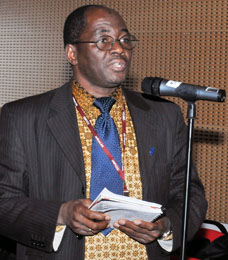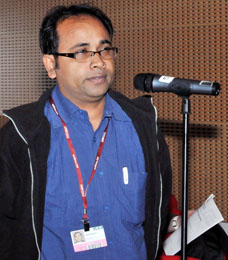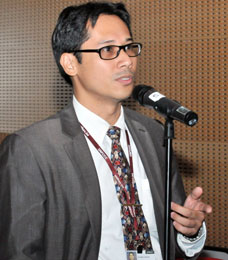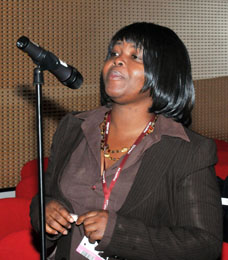|
|
 |
 |
 |
 |
 |
Enter your e-mail address
to get free e-mail reports |
|
|
|
|
 |
 |
 |
 |
 |
 |
 |
 |
Daily Reports
IISD Reporting Services (IISD RS) has produced daily reports of selected side events of this meeting. To download our reports please click below on the PDF icons that are next to the dates of your interest. |
|
 |
 |
 |
 |
|
 ENB on the Side - A Special Report on Selected Side Events at the Barcelona Climate Change Talks 2009 ENB on the Side - A Special Report on Selected Side Events at the Barcelona Climate Change Talks 2009
2-6 November 2009 | Barcelona, Spain
Events convened on Wednesday, 4 November 2009 |
 |
 |
 |
 |
The event brought together UN agencies working on REDD to highlight lessons learned from initial readiness activities.
Yemi Katerere, UN-REDD, chaired the meeting and explained that the programme is a collaboration of FAO, UNEP and UNDP, with the support of UNFCCC, the Convention on Biological Diversity (CBD) and others.
Tim Clairs, UNDP, outlined the features of national readiness management arrangements in nine pilot countries, including: assurance measures involving operational guidance from the UN rights-based approach to development; UN Development Group (UNDG) sustainability programming; initiation of country teams; use of harmonized financial transfers; and a harmonized readiness strategy. He noted that a GEF performance assessment shows high satisfaction with the programme.
Peter Holmgren, FAO, said measuring, reporting and verifying (MRV) is the cornerstone of REDD and described datasets from satellites and Global Information Systems (GIS) used for detecting forest change. He suggested that the data supports MRV, which is critical for assessing readiness in country programmes. He announced that information is available in a publication entitled “Building Confidence in REDD.”
Xueman Wang, World Bank, discussed Forest Carbon Partnership Facility (FCPF) programmes involving 37 REDD country participants, 10 donor participants, five carbon fund participants, and six observers, including indigenous peoples. She said early insights from the programme include the need for countries to place REDD at the center of a national development policy and integrate REDD into low carbon development strategies. She noted the value of strengthening understanding of and capacity to implement REDD among a large number of stakeholders.
Anne-Marie Wilson, CBD, noted links between REDD and biodiversity. She described case studies in Brazil and Mexico where protected area gap analysis is used to identify high priority sites, and where protection of these areas under REDD could maximize biodiversity, store carbon and secure key ecosystem services, such as provision of water and supporting sustainable livelihoods.
In the ensuing discussion, participants considered indigenous peoples’ rights, UN agencies’ support for REDD, a CBD analysis of benefit sharing, forest plantations, and national plans involving MRV variables for policy analysis and comparison.
|
|
 |
 |
 |
 |
|
 |
 |
 |
 |
The event considered climate adaptation and human mobility, with experts reflecting on environmental triggers, migration processes, governance and adaptation options.
Koko Warner, UNU Institute for Environment and Human Security, noted that four times as many people are displaced by weather events as by war.
Frank Laczko, International Organization for Migration (IOM), presented an overview of IOM’s new book, “Migration, Environment and Climate Change: Assessing the Evidence.” He suggested that migration can have both positive and negative impacts on environment and development. He supported more research on migration as part of an adaptation strategy and on the impact of gradual environmental change (as opposed to disasters).
Jenny Kirsch-Wood, Office for the Coordination of Humanitarian Affairs, highlighted the conclusions of a recent study, which found that disasters drive displacement. She suggested that in spite of research gaps it is still possible to take action now to reduce risks.
Jean-François Durieux, Office of the UN High Commissioner for Refugees, said many refugees are located in areas that are vulnerable to climate change impacts, including floods and drought.
Vikram Kolmannskog, Norwegian Refugee Council, advocated greater legal protection for refugees and said Copenhagen should recognize the humanitarian consequences of climate-induced migration and displacement.
Robin Mearns, World Bank, said climate change exacerbates existing vulnerabilities. He also outlined the research challenges and supported further country and sectoral studies.
In the ensuing discussion, a developing country delegate said migration is not a desirable form of adaptation. Responding to a question about positive impacts of migration, Frank Laczko noted the positive effect of remittances to regions impacted by disasters.
|
|
 |
 |
 |
 |
 |
 |
 |
 |
This event included presentations from governments on actions and successes, with the aim of building confidence and a sense of inspiration of what is possible.
Harald Winkler, South Africa, presented his government’s work on long-term mitigation scenarios and climate change policy responses. He reported that South Africa’s cabinet had supported a domestic “peak, plateau and decline” emission trajectory, peaking around 2020-2025. He said unilateral NAMAs could be adopted, but added that South Africa’s ultimate contribution depends to a significant extent on technological and financial support. He expressed concerns that the extent of such support is not yet being clearly indicated.
Agus Purnomo, Indonesia, noted his President’s speech to G20 leaders in Pittsburgh, US, in September, in which the President announced plans to cut emissions unilaterally by 26 percent by 2020, and by as much as 41 percent with international support. Purnomo noted that discussions were currently ongoing on policies to attain this target.
Alon Carmel, UK, outlined his government’s national strategy for climate and energy, which he said was reflected in legislation that included the UK’s emissions target of -34 percent by 2020 on 1990 levels, and -80 percent by 2050. He added that the UK’s overall aim is to decarbonize the UK while maintaining secure energy supplies, maximizing economic opportunities and protecting the most vulnerable.
In the ensuing discussion, one participant expressed satisfaction that both developed and developing countries are taking serious action, regardless of the status of the international negotiations. |
|
 |
 |
 |
 |
 |
 |
 |
 |
This panel brought together the partners of the Train to Copenhagen initiative to discuss the project and underscore the importance of rail to emissions reductions in the transport sector.
Margrethe Sagevik, UIC, said the Train to Copenhagen project includes a symbolic train journey from Kyoto to Copenhagen and a Climate Express to Copenhagen from Brussels with a 12-hour on-track seminar.
Lew Fulton, International Energy Agency, said there are four pillars to emissions reductions in the transport sector: increased efficiency; introduction of advanced technology vehicles; use of advanced biofuels; and modal shifts to more efficient modes of transport through better urban transit systems, high-speed rail and better land-use planning.
Holger Dalkmann, Transport Research Laboratory, emphasized the importance of investment in technology and infrastructure, strong policy measures, and behavioral change. He stressed that land transport should be included explicitly in the Copenhagen outcome.
Juan Luis Martín Cuesta, RENFE, reported on efforts in Spain to improve the efficiency of rail transport and expand the high-speed rail system. He said “trains are not the problem, but an important part of the solution.”
Train to Copenhagen partners Peter Lockley (WWF), Melody Hossaini (Youth and Climate Change), Sandra Freitas (Global Gender and Climate Alliance), and Jan Kappen (UNEP), highlighted the importance of building a sustainable transport sector, mobilizing leaders and leading by example.
|
|
 |
 |
 |
 |
 |
 |
 |
 |
The panel brought together the UNFCCC, UNDP and World Bank to demonstrate two pilot projects designed to provide information on financing for climate change to support developing countries.
Ari Huhtala, World Bank, and Lee Cando, UNDP, presented their new project to create a platform for information, learning and sharing on climate finance options. The planned web tool would provide users with a searchable database of resources on types of funds, availability and eligibility requirements. The tool will also include interactive features allowing users to upload information on their projects and share information and lessons learned related to project financing. A knowledge center will include tools to facilitate decision making, including a glossary of financial terms, a library of relevant documents and tools for “back of the envelope assessments” of climate investments.
George Anjaparidze, UNFCCC, provided a demonstration of the UNFCCC initiative to provide data on country contributions based on information in national communications. He highlighted challenges, including comparability of exchange rates, regional and country classifications and time series of data. He noted that the web portal will produce static reports by country, region or party, which can be downloaded into excel spreadsheets for further analysis. Interactive reports can also be generated with information broken down by sectors and parties depending on the users’ preference.
During the ensuing discussion, panelists said both web portals should be launched in 2010. Participants welcomed these efforts to make information on financing for climate change more readily available.
|
|
 |
 |
 |
 |
 |
 |
 |
 |
 |
 |
 |
 |
| Participants during the discussion. |
|
 |
 |
 |
 |
 |
 |
 |
 |
This event examined proposed policy options for agriculture and climate change, including agrofuels, biochar, and the commoditization of agriculture.
Helena Paul, EcoNexus, discussed environmental concerns about linking agriculture and climate change. She said linking production from fields and forests to emissions reductions may lead to commoditization through a rush into markets based on trading biofuels. She identified many serious impacts of climate change on agriculture, including extreme climate events, droughts, floods, storms, winds, unpredictable seasons, pest and disease patterns, water stress, and desertification.
Teresa Anderson, GAIA Foundation, discussed agrofuels in Africa in terms of their impacts on land, food and forests. She argued that production of agrofuels is leading to massive land grabs, eviction of people from rural communities, a food crisis, and impacts on forests and biodiversity. She stated that agrofuels are disastrous for small farmers and that, contrary to conventional wisdom, agrofuels have poor yields on “marginal lands” that are better suited for pastures. She also spoke about biochar (charcoal used to sequester carbon dioxide), noting estimates that one billion hectares of land may need to be planted to sequester enough carbon to stabilize climate change, and that 893 million hectares could be planted on marginal lands in Africa. She questioned this approach on the grounds that there is inadequate research indicating that biochar is effective for full sequestration.
Kamese Geoffrey, Uganda, presented challenges for biofuel production from maintaining sustainable agriculture. He said the conversion of land to fuel feedstock production has degraded fragile ecosystems, left communities exposed to famine, increased use of fragile ecosystems for fuel, and impacted food security and land rights. He argued that biofuels harm biodiversity, adversely affect soil, promote monoculture and contaminate water with pesticides. He further contended that agrofuels violate human rights, impact access to food, and exacerbate social and economic problems of landlessness, joblessness, and agrarian conflict.
Participants discussed the use of biofuels and plantations for CDM in Africa. Some participants mentioned positive agricultural practices in which the problems identified by speakers are addressed.
|
|
 |
 |
 |
 |

 |
 |
 |
 |
UN Framework Convention on Climate Change (UNFCCC) resources
 Official website Official website
 Daily programme Daily programme
 Side Events & Exhibits Side Events & Exhibits
 AWG-KP documents AWG-KP documents
 AWG-LCA documents AWG-LCA documents
 UNFCCC News UNFCCC News
UN resources
 Gateway to the UN System’s Work on Climate Change Gateway to the UN System’s Work on Climate Change
 Informal Thematic Debate of the UN General Assembly on Climate Change as a Global Challenge Informal Thematic Debate of the UN General Assembly on Climate Change as a Global Challenge
IISD RS resources
 IISD RS coverage of the Bangkok Climate Change Talks - 2009, 28 September - 9 October 2009, UN Conference Centre (UNCC), Bangkok, Thailand IISD RS coverage of the Bangkok Climate Change Talks - 2009, 28 September - 9 October 2009, UN Conference Centre (UNCC), Bangkok, Thailand
 IISD RS coverage of the Bonn Climate Change Talks - August 2009, 10-14 August 2009, Bonn, Germany IISD RS coverage of the Bonn Climate Change Talks - August 2009, 10-14 August 2009, Bonn, Germany
 IISD RS coverage of the Bonn Climate Change Talks - June 2009, 1-12 June 2009, Bonn, Germany IISD RS coverage of the Bonn Climate Change Talks - June 2009, 1-12 June 2009, Bonn, Germany
 IISD RS coverage of the UNFCCC Technical Workshop on Increasing Economic Resilience to Climate Change and Reducing Reliance on Vulnerable Economic Sectors through Economic Diversification, 28-30 April 2009, Cairo, Egypt IISD RS coverage of the UNFCCC Technical Workshop on Increasing Economic Resilience to Climate Change and Reducing Reliance on Vulnerable Economic Sectors through Economic Diversification, 28-30 April 2009, Cairo, Egypt
 IISD RS summary report of the Thirtieth Session of the Intergovernmental Panel
on Climate Change (IPCC), 21-23 April 2009, Antalya, Turkey (English: HTML - PDF) (Spanish: HTML - PDF) (Japanese: PDF) IISD RS summary report of the Thirtieth Session of the Intergovernmental Panel
on Climate Change (IPCC), 21-23 April 2009, Antalya, Turkey (English: HTML - PDF) (Spanish: HTML - PDF) (Japanese: PDF)
 IISD RS coverage of the Bonn Climate Change Talks - March/April 2009, 29 March - 8 April 2009, Bonn, Germany IISD RS coverage of the Bonn Climate Change Talks - March/April 2009, 29 March - 8 April 2009, Bonn, Germany
 IISD RS summary report of the UNFCCC Workshop on Integrating Practices, Tools and Systems for Climate Risk Assessment and Management and Disaster Risk Reduction Strategies into National Policies and Programmes, 10-12 March 2009, Havana, Cuba (HTML - PDF) IISD RS summary report of the UNFCCC Workshop on Integrating Practices, Tools and Systems for Climate Risk Assessment and Management and Disaster Risk Reduction Strategies into National Policies and Programmes, 10-12 March 2009, Havana, Cuba (HTML - PDF)
 IISD RS coverage of the UN Climate Change Conference - Poznań, 1-12 December 2008, Poznań, Poland IISD RS coverage of the UN Climate Change Conference - Poznań, 1-12 December 2008, Poznań, Poland
 IISD RS coverage of AWG-LCA 2, second part of the AWG-KP 5, and twenty-eighth sessions of the SBSTA and the SBI of the UNFCCC, 2-13 June 2008, Bonn, Germany IISD RS coverage of AWG-LCA 2, second part of the AWG-KP 5, and twenty-eighth sessions of the SBSTA and the SBI of the UNFCCC, 2-13 June 2008, Bonn, Germany
 IISD RS climate and atmosphere page IISD RS climate and atmosphere page
 Climate-L - A mailing list for news on climate change policy Climate-L - A mailing list for news on climate change policy
 Linkages Update - Bi-weekly international environment and sustainable development news Linkages Update - Bi-weekly international environment and sustainable development news
 MEA Bulletin - Newsletter on key MEAs and their secretariats MEA Bulletin - Newsletter on key MEAs and their secretariats
 Climate Change Policy & Practice - News and information on the actions of international organizations in responding to the problem of global climate change Climate Change Policy & Practice - News and information on the actions of international organizations in responding to the problem of global climate change
 African Regional Coverage African Regional Coverage |
|
 |
 |
 |
 |
|
|
 |
 |
 |
 |
 Please e-mail the Digital Editor should you have any questions regarding the content of this page Please e-mail the Digital Editor should you have any questions regarding the content of this page |
 |
 |
 |
 |
|
|
|